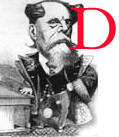 espite the great humour of Dickens and Thackeray, the whimsy of the Victorian burlesque and pantomime, and sometimes Pythonesque humour of the magazine Punch, we think of the Victorians as earnest. The age that gave us Lewis Carroll's Alice in Wonderland also gave us Tennyson's In Memoriam. The Victorian poets were essentially third-generation Romantics, Tennyson being a disciple of Keats and Browning of Shelley. Like their mentors, they grappled with religious and social issues, for they regarded the artist as society's conscience. The code of respectability and puritanism advocated by dissenters from the Church of England -- the Nonconformists and Evangelicals -- is summed up in the Sunday Observance Bill of 1837. Although thanks to such liberals as Dickens it was narrowly defeated, the Sober Sunday became an established custom in England.
espite the great humour of Dickens and Thackeray, the whimsy of the Victorian burlesque and pantomime, and sometimes Pythonesque humour of the magazine Punch, we think of the Victorians as earnest. The age that gave us Lewis Carroll's Alice in Wonderland also gave us Tennyson's In Memoriam. The Victorian poets were essentially third-generation Romantics, Tennyson being a disciple of Keats and Browning of Shelley. Like their mentors, they grappled with religious and social issues, for they regarded the artist as society's conscience. The code of respectability and puritanism advocated by dissenters from the Church of England -- the Nonconformists and Evangelicals -- is summed up in the Sunday Observance Bill of 1837. Although thanks to such liberals as Dickens it was narrowly defeated, the Sober Sunday became an established custom in England.
In contrast, as The French Lieutenant's Woman points out, some 8,000 prostitutes plied their trade in London at mid-century. At that time in the medium-sized industrial town of Leeds, a northern town in West Yorkshire, had two churches, 39 chapels, 451 taverns, and 98 brothels. But the newly-rich, insecure middle class insisted upon an outward respectability and conformity -- hence, the desire of Wilde's Jack Worthing's to keep up appearances for the sake of his ward, 'little' Cecily, whom he has kept secreted in his country-house as though she were some princess in a fairy-tale, and he some controlling enchanter or ogre.
Last modified 25 April 2025;
Thanks to Susan Verdon for correcting a geographical error!